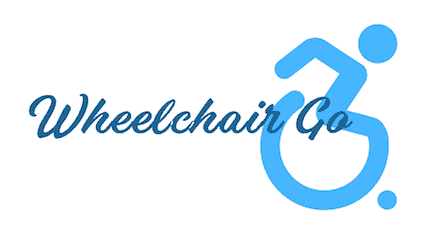Imagine wanting to visit your favorite park, attend a grandchild’s birthday, or simply run a quick errand to the grocery store – but feeling trapped because your mobility limits you. That’s the reality for many seeking a power wheelchair, a device that can unlock a world of independence. But where do you even begin?
Typing ‘power wheelchairs for sale near me’ into a search bar is just the first step. Finding the right power wheelchair, one that fits your specific needs and budget, requires navigating a maze of options. That’s why this guide is here. We’ll walk you through everything from understanding the different types of power wheelchairs and assessing your personal requirements, to finding both new and used options in your local area. We’ll also cover crucial aspects like financing, maintenance, and essential tips to ensure you make an informed decision. Let’s transform that search query into a path to newfound freedom.
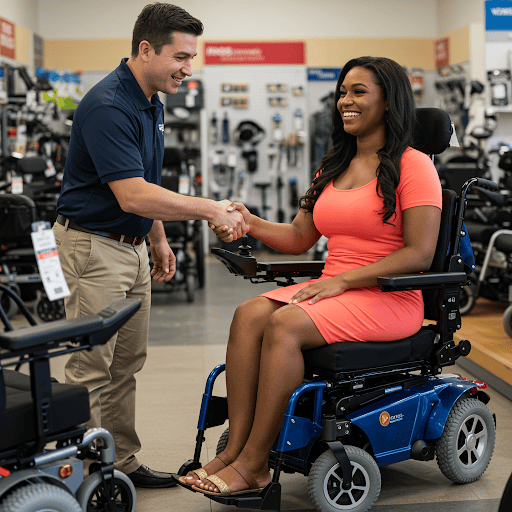
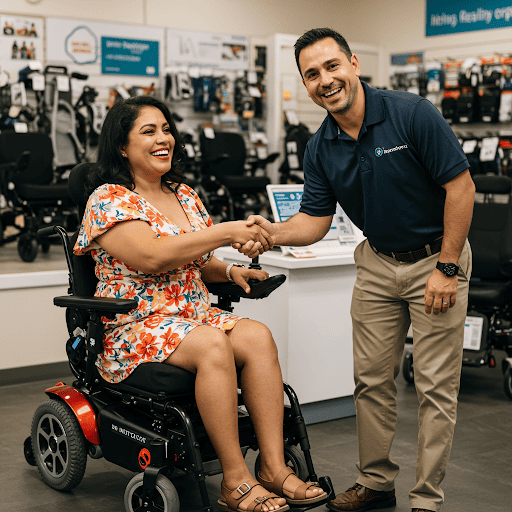
Understanding Your Needs
Before diving into the search for “power wheelchairs for sale near me,” it’s crucial to understand your individual mobility needs. This foundation will guide you toward the perfect electric wheelchair that enhances your independence and quality of life. Considering factors like the type of power wheelchair, your specific requirements, and the necessity of professional consultation will ensure you make an informed and beneficial decision.
A. Types of Power Wheelchairs:
- Front-Wheel Drive:
- Front-wheel drive power wheelchairs excel at navigating obstacles and rough terrain. Their design provides excellent stability, particularly when climbing curbs or traversing uneven surfaces. These chairs are often favored for outdoor use and offer a tighter turning radius compared to rear-wheel drive models, making them versatile for various environments.
- Mid-Wheel Drive:
- Mid-wheel drive wheelchairs are known for their exceptional maneuverability, especially in tight spaces. With the drive wheels positioned in the center, these chairs can pivot easily, making them ideal for indoor use and navigating crowded areas. They offer a smooth ride and excellent stability, providing a comfortable experience for users.
- Rear-Wheel Drive:
- Rear-wheel drive power wheelchairs offer a traditional driving experience and are known for their stability at higher speeds. They’re well-suited for outdoor use and longer distances, providing a smooth and predictable ride. These chairs are a reliable option for those who prioritize stability and performance on varied terrains.
- Portable/Travel Power Wheelchairs:
- Portable or travel power wheelchairs are designed for easy transport and storage. These lightweight and foldable models are ideal for individuals who frequently travel or need a wheelchair that can be easily transported in a vehicle. These power chairs often utilize lighter wheelchair batteries, and are made with lighter metals, to achieve their portability goals.
- Heavy-Duty Power Wheelchairs:
- Heavy-duty power wheelchairs are built to accommodate higher weight capacities and provide enhanced durability. These robust models are designed for individuals who require extra support and stability. They feature reinforced frames, powerful motors, and larger batteries to ensure reliable performance and extended use.
B. Assessing Individual Needs:
- Indoor vs. Outdoor Use:
- Consider where you’ll primarily use your power wheelchair. If you spend most of your time indoors, a mid-wheel drive model might be ideal for its maneuverability. For outdoor use, front-wheel or rear-wheel drive options offer better stability and performance on varied terrains. Additionally, consider the type of terrain you will be travelling over.
- Weight Capacity and Dimensions:
- Ensure the power wheelchair’s weight capacity meets your needs. Pay close attention to the dimensions of the wheelchair to ensure it fits through doorways, hallways, and other spaces in your home. Also, consider the size of the wheelchair when thinking about transportation.
- Specific Medical Conditions and Needs:
- Certain medical conditions may require specific features, such as adjustable seating, specialized controls, or enhanced support. Consult with your healthcare provider to determine the most suitable options. Consider any need for assistive technology to aid in controlling the chair, or for added comfort.
- Range and Battery Life Considerations:
- Assess your daily mobility needs and choose a power wheelchair with sufficient range and battery life. Consider how far you typically travel and how often you’ll need to recharge the battery. Understanding the limitations of your wheelchair batteries is important.
C. Importance of Professional Consultation:
- Consulting with physical therapists, occupational therapists, and mobility specialists is crucial. These professionals can assess your specific needs and recommend the most appropriate power wheelchair. They can also provide guidance on proper seating, positioning, and control options, ensuring optimal comfort and functionality. They can also aid in the process of applying for coverage from medicare, or other insurance providers.
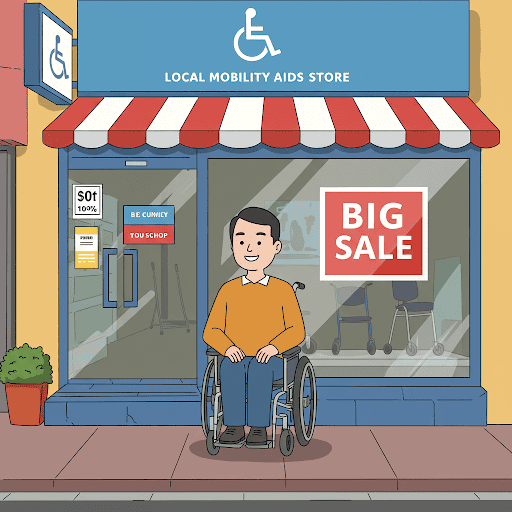
Finding New Power Wheelchairs Locally
When searching for “power wheelchairs for sale near me,” exploring local options is a crucial step in ensuring you find the right fit for your needs. Local dealers and retailers offer unique advantages, from personalized service to hands-on testing. This section will guide you through the process of finding and evaluating new power wheelchairs in your immediate area, helping you make an informed and confident decision.
A. Local Medical Equipment Dealers:
- How to find reputable dealers “near me”:
- Begin your search by using online search engines with specific keywords like “medical equipment dealers near me” or “power wheelchair stores [your city/region].” Online directories, local business listings, and even social media platforms can provide valuable information. Check online reviews and ratings to gauge the reputation and customer satisfaction of potential dealers. Additionally, referrals from healthcare professionals, such as physical or occupational therapists, can offer trusted recommendations.
- Benefits of buying from local dealers (service, support, customization):
- Purchasing from a local medical equipment dealer offers several advantages. Local dealers provide personalized service, including expert advice, product demonstrations, and assistance with fitting and adjustments. They often have certified technicians on staff who can provide ongoing maintenance, repairs, and battery replacements. Furthermore, local dealers can help with customization options, ensuring your power wheelchair meets your specific needs. This direct, in-person support is invaluable, especially when dealing with complex assistive technology.
- Consider more reliable well known brands:
- Reputable local dealers typically carry well-known and trusted brands like Permobil, Quantum Rehab, and Pride Mobility. These manufacturers are recognized for their high-quality electric wheelchairs, innovative designs, and reliable performance. When visiting local dealers, inquire about models from these brands, as they often offer a wide range of options to suit various needs and preferences. These brands offer a wide array of power chairs, from basic models, to complex rehab equipment, and therefore most dealers will carry at least one of these brands.
B. Online Retailers with Local Presence:
- Advantages and disadvantages:
- Online retailers with a local presence offer the convenience of online shopping combined with the benefits of local support. Advantages include a wider selection of power wheelchairs and competitive pricing. However, disadvantages may include limited in-person assistance and potential delays in service or repairs. Carefully evaluate the retailer’s local service capabilities and read customer reviews before making a purchase.
- Importance of verifying local service and warranty options:
- Before purchasing from an online retailer, verify their local service and warranty options. Ensure they have a physical location or authorized service center nearby. Clarify the warranty coverage, including parts, labor, and battery replacement. Ask about their repair process and response times. This due diligence ensures you have access to prompt and reliable support should any issues arise with your mobility aid.
C. Showroom Visits and Test Drives:
- Why it’s crucial to try before you buy:
- A showroom visit and test drive are essential before purchasing a power wheelchair. This hands-on experience allows you to assess the comfort, maneuverability, and overall suitability of the device. Trying different models helps you determine which one best meets your specific needs and preferences. It’s also a great time to ask questions of the sales staff.
- What to look for during a test drive (comfort, maneuverability, controls):
- During a test drive, pay close attention to the comfort of the seating, the ease of maneuvering in tight spaces, and the responsiveness of the controls. Evaluate the joystick or control panel, ensuring it is intuitive and easy to use. Test the wheelchair on different surfaces to assess its stability and performance. Check for features like adjustable armrests, footrests, and seating positions.
D. Financing and Insurance:
- Medicare and private insurance coverage:
- Medicare and private insurance may cover a portion of the cost of a power wheelchair, especially if it is deemed medically necessary. Contact your insurance provider to understand their coverage policies and requirements. Obtain a prescription from your physician and gather any necessary documentation to support your claim.
- Financing options and payment plans:
- Many local dealers offer financing options and payment plans to make power wheelchairs more affordable. Inquire about available financing options, including interest rates, repayment terms, and eligibility requirements. Some dealers may also work with third-party financing companies or offer in-house financing.
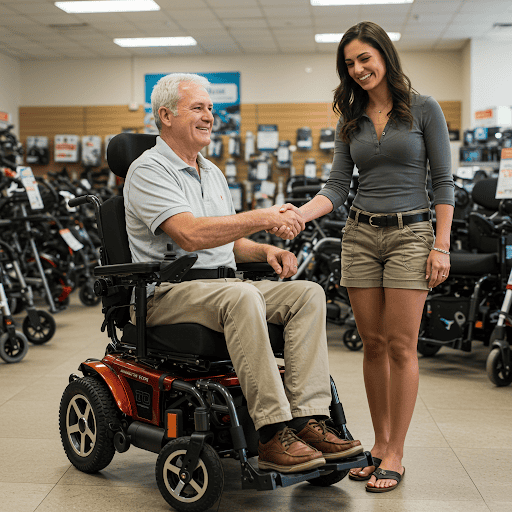
Exploring Used Power Wheelchair Options
For those seeking cost-effective solutions, exploring the used market for power wheelchairs can be a viable and beneficial option. While new models offer the latest technology and full warranties, used power wheelchairs often provide excellent functionality at a significantly lower price. However, it’s crucial to approach the used market with careful consideration and thorough evaluation to ensure you’re getting a reliable and safe mobility aid.
A. Benefits of Buying Used:
- 1. Cost savings.
- One of the most significant advantages of purchasing a used power wheelchair is the substantial cost reduction compared to buying a new model. This can make high-quality mobility aids accessible to individuals with limited budgets. You can often find well-maintained electric wheelchairs, and mobility scooters for a fraction of their original price, allowing for significant financial savings.
- 2. Immediate availability.
- Unlike new models that may require ordering and waiting periods, used power wheelchairs are often available for immediate purchase. This can be particularly beneficial for individuals who need a mobility solution urgently. In many cases, you can find a suitable used wheelchair locally, enabling quick acquisition and immediate use.
B. Where to Find Used Power Wheelchairs:
- 1. Online marketplaces (Craigslist, Facebook Marketplace, specialized websites).
- Online platforms like Craigslist and Facebook Marketplace offer a wide selection of used power wheelchairs. These platforms allow you to browse listings from private sellers, often with detailed descriptions and photos. Specialized websites dedicated to used medical equipment can also be valuable resources. When using these platforms, exercise caution and verify the seller’s credibility.
- 2. Local classified ads.
- Traditional classified ads in local newspapers or community bulletins can be a valuable source for finding used power wheelchairs. These ads often feature listings from individuals in your immediate area, making it easier to arrange viewings and test drives.
- 3. Nonprofit organizations and charities.
- Many nonprofit organizations and charities that focus on assisting individuals with disabilities often have programs that provide refurbished or donated power wheelchairs. These organizations may offer used mobility aids at reduced prices or even free of charge to those who qualify.
- 4. Used medical equipment dealers.
- Used medical equipment dealers specialize in buying and selling pre-owned medical devices, including power wheelchairs. These dealers often inspect and refurbish used equipment, ensuring its functionality and safety. Purchasing from a reputable dealer can provide added peace of mind.
C. Inspection and Evaluation:
- 1. Key components to check (battery, motor, frame, controls).
- When inspecting a used power wheelchair, pay close attention to the battery, motor, frame, and controls. Check the battery’s condition and charge capacity, ensure the motor operates smoothly, inspect the frame for damage or wear, and test the functionality of all controls.
- 2. Importance of a professional inspection.
- It’s highly recommended to have a qualified technician or mobility specialist inspect a used power wheelchair before purchase. A professional inspection can identify potential issues and ensure the equipment’s safety and reliability.
- 3. Battery testing and replacement considerations.
- Wheelchair batteries are a very important part of the used power chair. Battery life and health can vary significantly in used chairs. Check the batteries date codes, and ask when they where last replaced. Also inquire about testing the batteries, and calculate the potential cost of replacement batteries into your budget.
D. Warranty and Service:
- 1. Understanding the limitations of used equipment warranties.
- Used power wheelchairs may come with limited or no warranties. It’s essential to understand the warranty terms and conditions before purchasing. Inquire about any available warranties or service agreements.
- 2. Finding local repair services for used wheelchairs.
- Before purchasing a used power wheelchair, identify local repair services that can maintain and repair the equipment. Having access to reliable repair services can prevent unexpected downtime and ensure the longevity of your mobility aid. When searching for power chair repair “near me” make sure to verify that the repair shop has experience with the specific make and model of the used wheelchair.
Essential Considerations and Tips
Finding the right “power wheelchair for sale near me” is more than just a purchase; it’s an investment in your independence and quality of life. To ensure you make the most informed decision and enjoy long-term satisfaction, it’s crucial to consider several essential factors beyond the initial sale. These considerations span from home accessibility to ongoing maintenance and customization, all of which contribute to a seamless and comfortable mobility experience.
A. Accessibility and Home Modifications:
- 1. Ramps, Lifts, and Doorway Widening: A power wheelchair is only as effective as the environment it can navigate. Before finalizing your purchase, assess your home’s accessibility. Consider whether doorways need widening, if thresholds require ramps, or if multi-level homes necessitate a wheelchair lift. These modifications ensure seamless movement within your living space and prevent potential hazards. Investing in these changes transforms your home into a truly accessible environment, allowing for unhindered use of your mobility aid.
- 2. Transportation Options (Modified Vans, Public Transit): Expanding your mobility beyond your home involves considering transportation. Explore options like modified vans equipped with wheelchair lifts or ramps, which provide safe and convenient travel. Research local public transit services that offer accessible transportation for individuals using power wheelchairs. Understanding these transportation options ensures you can participate fully in community activities and maintain your social connections.
B. Maintenance and Care:
- 1. Battery Maintenance and Charging: The battery is the heart of your power wheelchair. Proper maintenance is vital for longevity and optimal performance. Follow the manufacturer’s guidelines for charging, avoid deep discharges, and store the battery in a cool, dry place when not in use. Regular battery checks and timely replacements ensure your “electric wheelchair” remains reliable.
- 2. Regular Cleaning and Inspections: Keeping your power wheelchair clean and well-maintained is essential for both hygiene and performance. Regularly wipe down the frame, seat, and controls to prevent dirt and grime buildup. Inspect the wheels, tires, and frame for any signs of wear or damage. Routine inspections can identify potential issues before they escalate, saving you time and money on repairs.
- 3. Preventative Maintenance: Proactive maintenance extends the life of your power wheelchair. Schedule regular servicing with a qualified technician to check the motor, controls, and other critical components. Preventative maintenance addresses potential problems before they arise, ensuring your “mobility aid” remains in top condition.
C. Customization and Accessories:
- 1. Seating and Positioning Options: Comfort is paramount when using a power wheelchair. Explore various seating and positioning options, such as adjustable cushions, backrests, and leg rests. These customizations enhance comfort, reduce pressure sores, and improve posture. Consider consulting with an occupational therapist to determine the most suitable seating system for your specific needs.
- 2. Control Modifications: Power wheelchairs offer various control options, including joystick controllers, head controls, and sip-and-puff systems. Customizing the controls to your abilities ensures easy and intuitive operation. Consult with a mobility specialist to explore different control options and find the one that best suits your needs.
- 3. Accessories for Comfort and Convenience: Enhance your power wheelchair with accessories like storage bags, cup holders, and phone mounts. These accessories add convenience and functionality to your daily life. Consider accessories that address your specific needs and preferences, making your mobility experience more enjoyable.
D. The Importance of Understanding the FDA’s Regulations Regarding Medical Devices:
The Food and Drug Administration (FDA) regulates medical devices, including power wheelchairs, to ensure safety and effectiveness. Familiarize yourself with the FDA’s regulations regarding medical devices to make informed choices. Ensure that the “adaptive equipment” you are purchasing meets the necessary safety standards. Understanding these regulations protects you from potentially harmful or ineffective products. This knowledge allows you to purchase your power chair with the confidence that it meets the required safety standards.
Some Final Thoughts…
In your quest to find “power wheelchairs for sale near me,” remember that your journey is about more than just a purchase; it’s about reclaiming your independence and enhancing your quality of life. We’ve explored the diverse landscape of power wheelchairs, from understanding your specific needs and the various types available, to navigating the options of buying new from reputable local dealers or exploring cost-effective used alternatives. By understanding the advantages of local dealers, such as personalized service and customization, and the potential savings of used options, you can make an informed decision.
Remember, showroom visits and test drives are crucial for ensuring comfort and maneuverability, while understanding financing and insurance options can alleviate financial stress. Don’t forget the importance of proper inspection and evaluation when considering used wheelchairs, and the necessity of finding reliable local repair services.
Beyond the purchase, consider home modifications for accessibility, prioritize maintenance and care for longevity, and explore customization and accessories to maximize comfort and convenience. Always ensure you understand the FDA’s regulations regarding medical devices. Ultimately, the right power wheelchair empowers you to navigate your world with confidence. We encourage you to take the next step: consult with a physical or occupational therapist, visit local dealers, explore used options, and prioritize your personalized research. As you embark on this journey, remember that the perfect power wheelchair is within reach, offering you newfound freedom and mobility. Your best ride awaits; take control and move forward with confidence.
Some Other Questions that People Also Ask
- “How much do power wheelchairs cost?”
- Costs vary widely, from a few thousand dollars for basic models to tens of thousands for highly customized or advanced models. Factors include features, brand, and new vs. used.
- “Where can I find used power wheelchairs for sale?”
- Online marketplaces (Craigslist, Facebook Marketplace), local classifieds, used medical equipment dealers, and nonprofit organizations are good places to start.
- “Does Medicare pay for power wheelchairs?”
- Medicare Part B may cover power wheelchairs if deemed medically necessary and prescribed by a doctor. Specific requirements and documentation are needed.
- “What is the best power wheelchair for outdoor use?”
- Rear-wheel drive or mid-wheel drive models with robust suspensions and heavy-duty batteries are generally best for outdoor use. Consider terrain and range requirements.
- “How do I choose the right power wheelchair?”
- Assess your individual needs (indoor/outdoor use, weight capacity, medical conditions), consult with professionals, and test drive different models.
- “Are there power wheelchairs for heavy people?”
- Yes, heavy-duty power wheelchairs are designed with higher weight capacities and reinforced frames to accommodate larger individuals.
- “Where can I get power wheelchair repairs near me?”
- Local medical equipment dealers, specialized repair shops, and some online retailers offer repair services. Check warranties and ask for recommendations.
- “How long do power wheelchair batteries last?”
- Battery life varies depending on usage, maintenance, and type. Typically, they last 1-3 years with proper care. Daily range can also vary greatly depending on battery type and terrain.
